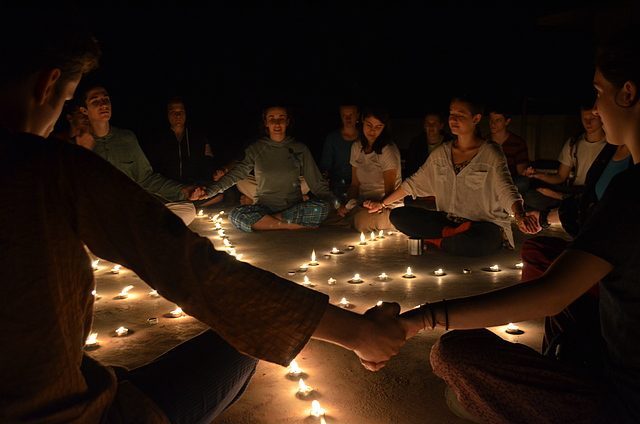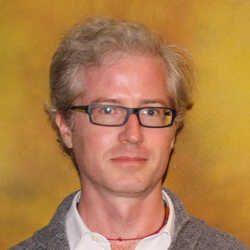A Discussion with Faculty Director Arthur McKeown


What inspired you to plan Buddhist Studies in Bodh Gaya, India? What did you hope to accomplish?
The Buddhist Studies in Bodh Gaya, India program has actually been running since 1979. It was originally run by Antioch College in Ohio (where I began working in 2010), and then was taken over by Carleton in 2016, roughly when I became Program Director.
What makes this program different from other study abroad programs?
This program is different from other study abroad programs in a number of ways. Firstly, there is a large meditation component to this program. Upon arriving in Bodh Gaya, we ease the students into a daily meditation routine in which the group meditates for an hour in the morning and an hour in the evening, six days a week. This traditional meditation approach provides students with a unique opportunity to reflect upon their mental and physical health. The transition from studying at Carleton to living in Bodh Gaya during the middle of “festival season” (with its accompanying sights, sounds, colors, smells, etc.) can be abrupt for students, and this meditation practice helps individuals check in with themselves and address their needs on a day-to-day basis (“What do I need today? Do I need rest? Do I need support? How much do I want to challenge myself today?”).
Later in the term, we will incorporate more advanced meditation practices, such as one that we call “sending and receiving.” In this practice, each student will focus their energy on sending someone (a stranger, a friend, a colleague, a family member, etc.) positive energy, and in doing so, will likely be the recipient of somebody else’s kindness/gratitude. In my many years working with the program, I have witnessed the benefits that these meditative practices have had for students. They train themselves to see how “wild” their minds can get, and then they learn how to take the necessary steps to address this. We’ve had students whose social anxiety decreased as a result of these reflective, compassion-oriented practices, and in general, students walk away from this program with a different way of viewing and thinking about others.
Another way in which this program differs from other study abroad programs is through its robust independent study component. For the final part of the program, students will have the opportunity to engage with a topic of their choosing and conduct independent research, culminating in either an end-of-term paper or presentation of their findings. In this three-week independent study period, students will have the freedom to travel to a number of approved locations and create their own schedules. This is an enormously rewarding and empowering experience for students, who often come out of the program with a new sense of agency.
Bodh Gaya is a unique place. The students first arrive at a time in the year when Bodh Gaya is relatively quiet, so they get a sense of ownership of the place. However, as the program progresses, people from all around the world begin to flock to the city, and the city comes alive with colors, cultures, peoples, festivals, and life. There will be days when the students merely wish to observe/learn about the traditions that they will be exposed to, and there will be other days when they want to push themselves to engage more deeply.
What does a typical day look like on your program?
A typical day on the Buddhist Studies in Bodh Gaya program might look something like this:
- 05:00 AM – Wake up.
- 05:30 AM – Go to morning meditation.
- 06:30 AM – Have breakfast in the dining hall. This is one of the aspects of the program that students say that they miss the most upon returning to Carleton. Every morning, the program’s incredible Indian staff prepares a gourmet breakfast for the students; this could include eggs, pomegranates, mangoes, guavas, papayas, cereals, and more.
- 07:30 AM – Attend language classes.
- 10:00 AM – Tea time! Students can run down to grab a spiced chai before settling in for their second round of classes.
- 10:30 AM – Attend class & language practice.
- 01:00 PM – Lunch!
- 02:00 PM – Free time. Every day, classes are finished by lunch, after which students are free to do as they please. They can explore Bodh Gaya, attend festivals (since we will be there during “festival season”), visit a local temple or monastery, go for a hike, spend time with one another and the friends that they will undoubtedly make within the community, or simply relax. Because Bodh Gaya is relatively small, students will likely run into one another during their explorations around town.
- 05:00 PM – Convene for afternoon meditation.
- 06:30 PM – Dinner! For the first three weeks, the program provides dinner for the students. After those initial three weeks, however, students will be provided with a stipend to go into town and purchase their own dinners. This provides students with the opportunity to try new foods of their own choosing.
- 07:30 PM – Phone time. Students on this program are encouraged to take full advantage of their study abroad experience by minimizing the time spent on their phones/social media. However, each night, students will have the chance to “catch up.”
Because both students and faculty members will be living in such close proximity to one another, the Buddhist Studies program fosters a powerful sense of community and kinship. In the absence of technology (due to our low-technology policy), students are encouraged to engage in meaningful conversations with one another. Every time that I have run this program, students have had the types of conversations that we all wish to have but often don’t know how to have. Every student undergoes an enormous amount of personal growth and reflection during this program, the likes of which fuel discussions on identity, aspirations, struggles, and dreams.
What advice would you give to students to encourage them to study abroad during their Carleton career? What benefits do you see to the experience in general?
Studying abroad is a truly life-changing experience. You learn so much about yourself, about your boundaries, and about how strong you really are. You will surprise yourself with your capabilities, and by the end of your experience abroad, you will be proud of the things that you accomplished. The assumptions that you brought with you to the program (about yourself, about others, and about the world) will be challenged by your experiences abroad, and you will leave the program completely transformed.
Arthur McKeown is the Director of the Buddhist Studies Program in Bodh Gaya, India and Associate Professor of Asian Studies. He has been at Carleton since 2016.